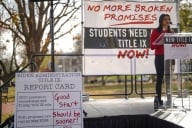You have /5 articles left.
Sign up for a free account or log in.
The University of New Mexico will reopen its investigation into a professor who was sanctioned previously for sexual harassment -- after it initially agreed to welcome him back to campus following a suspension.
“Following recent media reports about a university investigation into claims of sexual harassment in [the] anthropology department, new information has surfaced that we feel must be considered,” President Robert Frank said in an emailed statement. “In light of these additional reports, we will thoroughly review the full case again along with any new material that we obtain. As we carefully consider all of the evidence, we promise to take appropriate actions as warranted. … Let me assure you this issue has our full attention.”
The faculty member in question, Cristobal Valencia, is an assistant professor of anthropology. He was suspended earlier this year, but it’s unclear exactly why; personnel files first obtained by the Albuquerque Journal through an open records request were heavily redacted by the university, including which policies Valencia was accused of violating. But a March memo to Valencia from Mark Peceny, dean of the College of Arts and Sciences, says that a sexual harassment and discrimination investigation demonstrated he’d violated relevant university policies.
Peceny wrote that he was suspending Valencia immediately, with pay, in light of the “extremely serious nature” of the findings. (Note: This sentence has been updated from an earlier version to reflect that Valencia was suspended with pay.)
Valencia is scheduled to return to teaching this fall, after he received a “censure” -- a permanent personnel file note and mandatory monitoring by colleagues -- effectively lifting the suspension. Les Field, Valencia’s department chair, reportedly told the Journal that he’d imposed the censure. He declined comment to Inside Higher Ed on Monday, saying he couldn’t comment on a confidential personnel matter.
Valencia did not immediately respond to a request for comment.
Since last week, a number of professors have reportedly complained that Valencia will resume teaching duties after being found guilty of serious harassment. New details about his alleged conduct, as well as at least one additional report of harassment, also have emerged. A faculty memo reportedly given to Peceny in January and obtained by the Journal says that there were incidents of “students being encouraged to get drunk and party with drugs at his home, in which they were then encouraged to sleep over at his house, where unwanted sexual advances were made.” Valencia allegedly created a list of female graduate students he’d like to have sex with and inappropriately touched and flirted with graduate students at public events.
The faculty memo also alleges that Valencia disparaged white, female colleagues, saying, “I don’t take orders from white bitches,” and calling a colleague a “stupid white” expletive in front of another professor and students.
Valencia’s colleagues “continue to work in a hostile working environment, where they fear retaliation and are concerned about the safety of their graduate students,” the letter says.
Last week, KOB-TV, a local news station, aired interviews with students and an anonymous former New Mexico professor who said she'd left the university because of Valencia.
The university said Monday that Valencia was part of an internal Office of Equal Opportunity investigation into the climate of the anthropology department as a whole, starting in 2015. The process is still not complete, because disciplinary actions are being appealed. Since last week’s media reports, at least one other complaint has been filed, according to the university, and further action will be taken, if warranted.
The equal opportunity office’s role is to review and make findings regarding alleged civil rights violations, “and then administrators and supervisors must determine what discipline and remediation measures are fair and effective,” the university said in a statement. “Discipline may involve suspending or firing an offender, but does not require it. The goal is to prevent future misconduct.”
Frank in his statement said that New Mexico officials are “listening to your concerns and are working to address them,” and that the university is committing additional resources to monitoring the situation and responding to students. He urged victims of harassment or discrimination to continue to come forward.
This week is not the first time New Mexico’s been in hot water over its handling of a sexual harassment case. The U.S. Justice Department earlier this year said the university failed to comply with federal antidiscrimination laws related to harassment.
Valencia’s case is also far from the first in which a university has been accused of being soft on faculty harassers. The University of California’s Los Angeles and Berkeley campuses have seen recent student and faculty protests over known serial harassers being allowed to return to work with perceived slaps on the wrist, for example.
An ongoing case at Yale University has raised similar concerns, as well as concerns about how known harassers can pass from one institution to another with no record of past offenses. That issue prompted one U.S. lawmaker to suggest legislation that would prevent the phenomenon, known as “pass the harasser.”
At the same time, such cases raise issues of due process and rehabilitation. A professor found guilty of serial sexual harassment at one institution told Inside Higher Ed earlier this year that he’d completely resolved his conduct issues and was successfully teaching elsewhere, in part as a result of the initial investigation.
In any case, colleges and universities across the country are facing unprecedented legal and public pressure to respond effectively to reports of sexual harassment and assault. And public pressure certainly appears to be part of Valencia’s ongoing case.
The American Association of University Professors’ statement on suggested policy and procedures for handing sexual harassment complaints says a victim should present his or her complaint as promptly as possible after the alleged harassment, mainly to aid investigation.
Anita Levy, associate secretary of AAUP, said that assuming new complaints have arisen in a case such as Valencia's, “there would be nothing to prevent a new inquiry from taking place now.” But absent any new allegations, she said, it would be “unwarranted to reopen an investigation that already resulted in a severe sanction.”
Brett Sokolow, president and CEO of the National Center for Higher Education Risk Management and an expert in campus sexual assault and harassment proceedings, said he couldn’t comment on Valencia’s case, or any case, in particular. But he said that one of two things tend to be happening in cases similar to his -- either new information emerges after an investigation, especially one that wasn’t handled correctly the first time around, or, more commonly, colleges and universities are struggling to find a new normal for disciplinary proceedings as campus cultures increasingly have zero tolerance for sexual harassment.
Sokolow attributed part of the problem to “faculty shared governance over faculty sexual harassment,” meaning that faculty panels or academic officers still hold the power in such investigations and deciding of sanctions, rather than human resources departments, which might offer a more standardized approach.
“I’m not saying there necessarily has to be tougher sanctions of faculty members, but campuses have to figure out whether to accede to these new community demands, or push back against the shifting set of expectations that are unfolding right now,” Sokolow said. “I can’t tell you what an appropriate sanction would be, but I can tell you that over the last six years many, many campus communities are far less tolerant of midlevel harassment than they used to be.”









